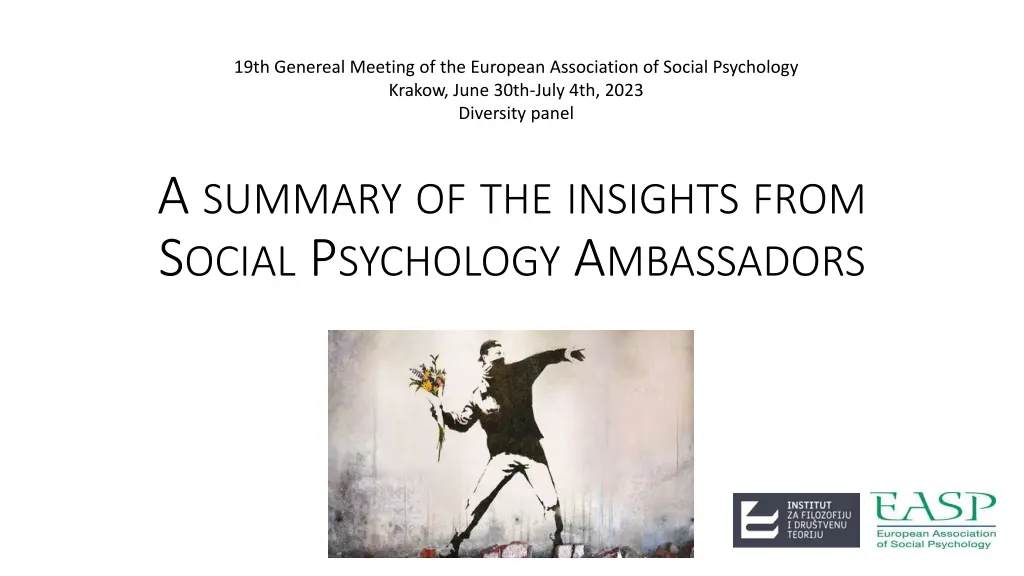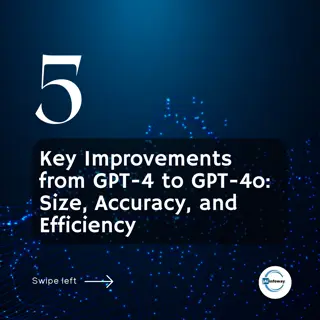
Insights from Social Psychology Ambassadors in South and East Europe
Explore the journey of the Social Psychology Ambassadors Project in South and East Europe, focusing on the underrepresentation of the region and the collaborative initiatives identified through local roundtables and a regional meeting in Belgrade. Learn about the common challenges faced by social psychologists and the efforts to integrate the region into the European community.
Download Presentation

Please find below an Image/Link to download the presentation.
The content on the website is provided AS IS for your information and personal use only. It may not be sold, licensed, or shared on other websites without obtaining consent from the author. If you encounter any issues during the download, it is possible that the publisher has removed the file from their server.
You are allowed to download the files provided on this website for personal or commercial use, subject to the condition that they are used lawfully. All files are the property of their respective owners.
The content on the website is provided AS IS for your information and personal use only. It may not be sold, licensed, or shared on other websites without obtaining consent from the author.
E N D
Presentation Transcript
19th Genereal Meeting of the European Association of Social Psychology Krakow, June 30th-July 4th, 2023 Diversity panel A SUMMARY OF THE INSIGHTS FROM SOCIAL PSYCHOLOGY AMBASSADORS
Social Psychology Ambassadors Project To establish and empower a network of social psychologists from ten countries within the region of South and East Europe (Bosnia & Herzegovina, Croatia, Czech Republic, Hungary, Kosovo, Romania, Serbia, Slovakia, Ukraine, Latvia) and facilitate their further integration into the European community A two-fold goal: a more in-depth understanding of the underrepresentation of the region and defining topics of common interest as a base for developing collaborative projects
The process Two steps: 1. local roundtables with social psychologists in each country 9 roundtables (except for Ukraine), semi-structured discussions with researchers self-identified as social psychologists reports were prepared after each of the meetings 2. a regional meeting in Belgrade, held on 18-19 May, 2023 25 participants from 9 countries integration of the insights from the local roundtables and presentation of research collaboration initiatives
Phase 1: Local roundtables Held in Slovakia (+Czechia), Hungary, Romania, Kosovo, Croatia, Latvia, Serbia, Bosnia&Herzegovina Varying degree of representativeness for the local social psychological community The issue of self-selection: internationally more active researchers were more likely to participate Membership in the EASP quite rare (from 0 members to never more than 50% of participants)
Common issues vs. particularities The impression is that most of the experiences are shared and issues/challenges recognized are common to all of the countries (with some exceptions) Researchers reported that they are facing challenges that are complex and multi-faceted: an internationally underprivileged position, but also those related to the local systems and institutional administration Relevant factors: systemic uncontrollable (e.g., cultural and institutional), systemic controllable (related to the organization), individual The issue of the professional identity of social psychologist
Common issues and challenges (verified) Insufficient international participation An underprivileged position within collaborations/within organizations Lacking material resources (leading to self-financing) A lack of training in the most recent and advanced topics (e.g. statistical methods) Biases faced in the publication process internationally Self-handicapping A lack of information Early career researchers recognized as an especially vulnerable group Dependent on the connections of their supervisors
What can the researchers from the region contribute? Developing/strenghtening national and regional networks of researchers to disseminate information and provide support Make available databases of past successes (projects and grants that have been won by regional researchers) Increase the visibility of the regional social psychological research on social networks (e.g., connecting the institutional profiles) Initiate and join regional research initiatives Continue the collaboration instigated by the SPA project
What can EASP do? Strive toward a more inclusive identity of the organization toward the whole of Europe Recognizing the specificities of the position of researchers from the non-Western countries (especially, those affiliated with institutions in these countries), also, the within-regional variations
To improve the inclusiveness of the organization A conscious effort to diversify governing bodies and editorial boards of journals Reaching out to the researchers from the region Perceived obstacles: high fees, the image of elitism (e.g. the recommendation system for becoming a member), dissemination of relevant information Some low-bugdet solutions: arranging online info sessions for potential members/grant applicants /summer schools a buddy-system for new members
To tackle the lack or resources Importantly, any steps should not reinforce tokenism Grants Reconsider the current criteria for grant proposals, e.g. applicants withouth recourse to other grants or applicants within a salary range Increased visibility of non-Western grant holders (affiliated with non- Western institutions) Make explicit the implicit requirements in calls Conferences A reduced fee for conference participation (similar to membership fee)
Supporting knowledge exchange/visibility of regional researchers Supporting workshops for the exchange of knowledge across the regions (e.g. advanced methods and techniques, on how to review in a sensitive way etc.) Promoting non-Western key-note speakers at EASP-sponsored meetings Supporting young researchers to attend the summer school
The Social Psychology Ambassadors project Challenges Separating research and networking support A collaborative effort to reach out to new members within the region Opportunities Helpful for initiating collaborations and furhter integration within the region Several initiatives taken toward this goal

